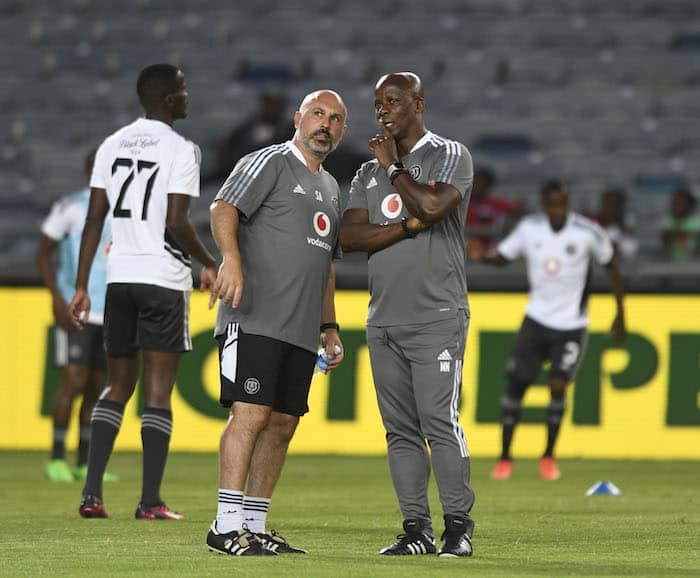The head coach generally gets the plaudits, or the blame, but what is the role of the assistant? By Mark Gleeson.
Powerful managers have existed for the past century, from Arsenal’s legendary Herbert Chapman to Alberto Suppici, who won the first World Cup for Uruguay in 1930, and the modern incarnations such as Sir Alex Ferguson, Rinus Michels, José Mourinho, Pep Guardiola and this country’s most successful tactician, Pitso Mosimane.
In South Africa, coaches did not exist until well into the professional era, which began at the end of the 1950s, and then for decades thereafter were just on a part-time basis. Clive Barker drove taxis, Eddie Lewis sold insurance and Trott Moloto was a teacher.
Clubs and representative teams used to have a trainer, but he was there for the physical work, while selectors picked the team. They were usually committee men, some with little knowledge of the game.
The landscape could not be more different these days, with the coaches employing multiple layers of assistants, analysts and conditioning experts to help them achieve success.
The most crucial element of this is the assistant coach … the right-hand man.
But what makes a top assistant coach? What are the elements they must bring to ensure their boss wins games and they both get to keep their job?
“Ideally, and this doesn’t always happen, but you should have a head coach who is in charge and then the man who is basically number two, and there must be a good relationship between the two,” explains Sergio dos Santos, one of the few coaches to have taken charge of both Kaizer Chiefs and Orlando Pirates.
“It must be solid as a rock; you don’t have to watch your back or worry about what is happening around you. You must have his backing, commitment, dedication and loyalty,” he says of the assistant coach.
Even, he adds, to the extent of being able to take over. “Say you’ve got the ’flu or something like that and you cannot make the game, it is a guy who you know can take the reins and lead from the front, just like you would.”
Often in South African football, coaches arrive at clubs, or in the national-team job, to find an assistant already in place. High-profile foreign coaches in particular were asked to use a local as an assistant almost as teaching project. Stuart Baxter is a good example of this.
Then there is also the nursemaid element. When Philippe Troussier was appointed by Chiefs in 1993, Kaizer Motaung asked Trott Moloto to come along and help guide the Frenchman, who was young and notably volatile, but had much success already in west Africa.
“I met a guy who was crazy. I had to manage him,” Moloto remembers with a hearty laugh. “Often, I had to stop him trying to punch a player. But most important was to try and protect the potential that the club had at that time with so many good players. I was the one they also went to with their concerns and complaints.”
When Benni McCarthy took over at AmaZulu, he insisted that the club hire his old Cape Town city assistant Vasili Manousakis.
“The energy that the head coach projects almost dictates what role he wants you to fulfil, or the role he’s comfortable with. We share the same philosophy about how the game should be played. That makes things a whole lot easier,” says Manousakis, who has gone on to be the head coach at Richards Bay.
But it is not a relationship of equals. “There is an imaginary line that I see, that I feel and that I think an assistant should never cross. You don’t need to act as, or try and be, the head coach. You need to fulfil and deliver the role as best you can, to support the coach.”
But support does not mean being a ‘yes man’: “With me and Benni, it was all about trust and honesty. I’m going to tell him my opinion and do it respectfully, and that’s what it is … it’s my honest opinion. I’m not there to agree with him and I think that’s what he wants. He doesn’t want a robot, someone who shadows him or picks up cones.”
In 2016, Sir Alex Ferguson wrote Leading, a book about management techniques that suggest it is almost an art form. “Some characters are more suited to being second in command,” he wrote.
“I would have been a terrible No 2 because there is a part of my personality that needs to be the leader. It takes considerable skill to be content as second fiddle, because even if you work just as hard as the leaders, you never receive the same praise or financial rewards.”
Today’s benches may look like Formula One pit crews, but the top tier is pretty standard – coach, assistant, goalkeeping coach and analyst.
In South Africa, the coaches almost exclusively run the training, but overseas, it is often the No 2 that is in charge of the sessions while the boss watches on.
Ferguson certainly did not run every training session. That is why former Bafana Bafana boss Carlos Queiroz was a good fit with all his technical expertise, while Ferguson worked his magic through his force of personality.
Photo by Sydney Mahlangu/BackpagePix





